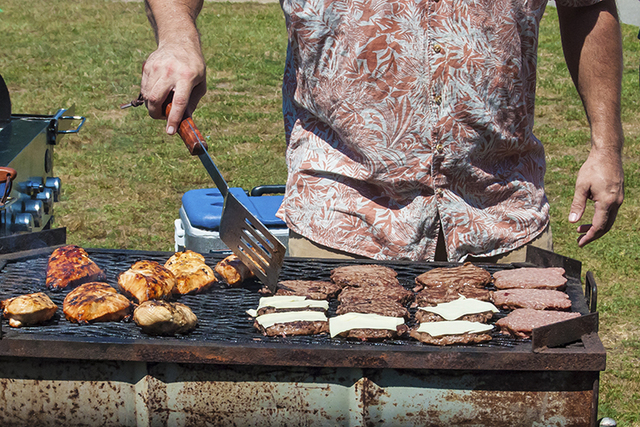Simple techniques can make backyard grilling healthier

The issue seems to reignite, as it were, every time summer grilling season rolls around.
Does grilling meats increase cancer risks?
“It’s one of those issues that keeps coming back,” says Dr. James Sanchez, a medical oncologist with Comprehensive Cancer Centers of Nevada.
The suspect in the grilling-cancer link is “direct flame on your food, especially meats,” Sanchez says. When the high heat of a grill — regardless of whether it’s fueled by charcoal, gas or wood — hits a protein in meat called creatine, it creates polycyclic aromatic hydrocarbons, or PAHs, and other substances that “are considered to be carcinogenic.”
“They take them in the laboratory and rub them on the skin of a rat or mouse, or have them ingested, and, sure enough, in high quantities, the animals will develop cancer,” Sanchez says.
But translating lab results into eating meats cooked on the backyard grill is tricky. And, Sanchez says, “there has never been what we would call a definitive study (showing) a cause-and-effect type of process, where it has been shown unequivocally.”
Nonetheless, there are things backyard cooks can do to “reduce the risk or likelihood of getting these abnormal carbon products,” Sanchez says.
“One would just be avoiding direct exposure to an open flame or that hot metal surface, but that’s half the joy of having barbecue. So one thing you could do is take the meat and put it in the microwave first. That way, it reduces the time of exposure to the really high heat over the grill. So you can still get the grilled effect but don’t have to grill it that long.”
Continuously turn the meat to prevent charring, Sanchez says. Trim fat away from the meat to prevent flare-ups — rising smoke also contains suspected carcinogens — and cut away charred portions of meat before serving.
Then, Sanchez says, “like anything else in life, everything in moderation. You can enjoy your barbecued meat, but maybe don’t do it so often.”
Other meats, along with beef, contain creatine “to a certain degree, but not as much,” Sanchez says, so incorporate fish and other types of meats into your outdoor cooking menu.
Pair your meat entree with some cancer-fighting grilled veggies. Sanchez says grilled Brussels sprouts are very tasty and, like other cruciferous vegetables, can help reduce cancer risks.
Sanchez, an avid backyard cook himself, laughs. “Sort of like having a greasy hamburger with a Diet Coke.”
Sanchez says he has cut back on grilled beef quite a bit over the years, but “there’s still nothing that compares to a backyard barbecue.”


















